What it’s like living as a locum tenens physician in New Zealand
September 11, 2025
For many physicians, the idea of practicing medicine abroad is both exciting and intimidating. With its dramatic landscapes, welcoming people, and need for physicians across specialties, New Zealand is one of the most popular destinations for physicians interested in working locum tenens internationally. But what is it really like to live and work there, not just clinically, but day to day, with your family, spouse, or even pets?
We spoke with several physicians and their partners who took assignments in New Zealand through Global Medical Staffing to capture the full picture: from the decision to go, to the logistics of the move, to what life is like once you are settled.
Why physicians choose locum tenens in New Zealand
For some, the draw is professional renewal. After 20 years in private practice, family medicine physician Dr. Elizabeth Dayton decided she needed a reset. “I was a little burned out with my schedule,” she recalls. “I was worn out and ready for a change.”
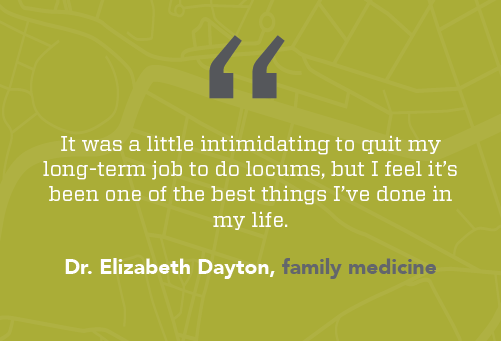
Others were motivated by adventure and family experiences. Family medicine physicians Dr. Jason Heine and his wife, Shauna, always knew they wanted to live in New Zealand. “We initially said that we would go when our youngest daughter turns five, because we felt like she'd be old enough to hopefully remember the experience, but our oldest wouldn't be so old that we'd be tearing her away from her preteen friendships and activities,” Dr. Heine says. Their timeline accelerated during COVID, when New Zealand’s insulation from the pandemic made it feel like the right moment.
For radiologist Dr. Greg Kapala, locum tenens was a way to blend medicine with travel. Since 2008, he has returned to New Zealand again and again for three- and six-month stints. “I love hiking; it’s a big thing for me,” he says. “Before my locums trips, I had been to New Zealand for vacation.”
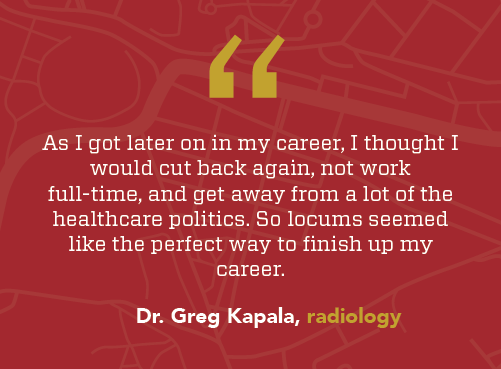
Locums allowed him to cut back from full-time work, avoid healthcare politics, and deeply experience another culture.
Preparing for the move: Banking, visas, and pets
The adventure begins long before you board a plane. Preparing for a move abroad takes several steps, especially when it comes to logistics.
Banking and paperwork
Emergency physician Dr. Tracy Parrish wishes she had known how structured New Zealand’s banking systems are. “Everything in New Zealand is by appointment,” she explains. “You can’t just walk in. It’s tough to walk in and get something done, even at the bank.” She recommends setting up your bank account online a couple of weeks before your move, transferring funds, and booking an appointment for the day after you arrive. Once you are in New Zealand, go to your appointment at the bank and activate your account.

A bank account is essential for securing housing and applying for your IRD tax number (New Zealand’s equivalent of a Social Security number), which you’ll need to get paid.
Visas and medical exams
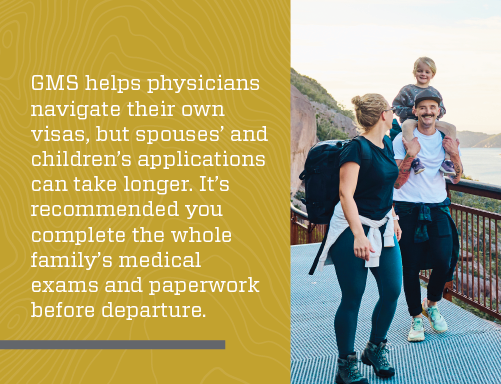
Global Medical Staffing helps physicians navigate their own visas, but spouses’ and children’s visa applications can take longer. Dr. Parrish recommends completing the whole family's visa medical exams and paperwork before departure, because sorting their paperwork can take up to four months. Her husband and children had to learn about the long wait the hard way and consequently spent a lot of time at home waiting and checking the mail.
Bringing pets while on assignment in New Zealand
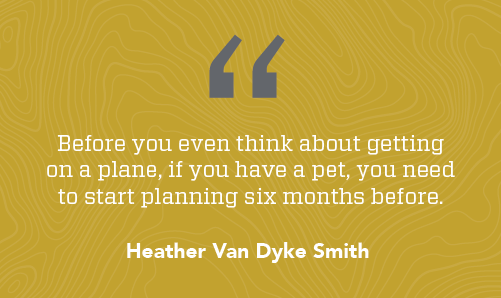
There are strict regulations on importing pets to New Zealand. Heather Van Dyk Smith, who moved with her husband, Dr. Bryan Smith, and their children to New Zealand, says, “Before you even think about getting on a plane, if you have a pet, you need to start planning six months before.”
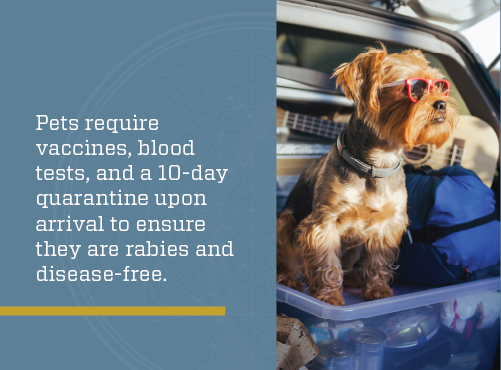
Pets require vaccines, blood tests, and a 10-day quarantine upon arrival to ensure they are rabies—and disease-free. Once the paperwork is complete, the next step is to prepare your pet for the long flight. This means using an airline-approved crate and following specific guidelines to ensure your pet’s safety during travel.
Given the time-consuming and costly nature of the process, Heather advises future locums to think carefully about whether bringing a pet is the best option. She suggests leaving them with family or friends if the assignment in New Zealand is only temporary. “It is tough to hear, but it’s something that people should consider, especially if they are going to come back.”
Housing and daily living in New Zealand
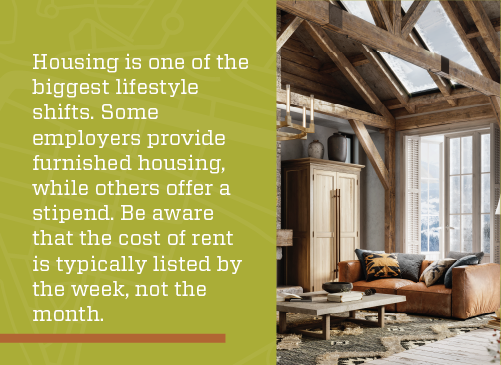
Housing is one of the biggest lifestyle shifts. Some employers provide furnished housing, while others offer a stipend. Heather Van Dyk Smith notes that the cost of rent is typically listed by the week, not the month. “When I saw the amount of $490, I was thinking, ‘Oh wow, per month!’ It’s per week, so you have to multiply that by four,” she says.
Every day life feels familiar yet distinct. Grocery and fuel costs are higher, but farmers’ markets provide affordable fresh produce. Driving is on the left side of the road, and even short distances can take longer than expected. Uniforms are required for children attending schools in New Zealand, and the grading system differs from the U.S., but most adjust quickly.
Get the inside scoop: Learn more about Dr. and Heather Van Dyke Smith's time in New Zealand
Climate control
Many rentals are modest but comfortable, though insulation and central heating are often lacking or unavailable.
Be aware that many older houses lack climate control when looking for your rental. “Unless it’s a new house, the heating systems are probably nonexistent,” Heather says. “Same with air conditioners. Kiwis have a lounge with a fireplace or wood burner, and a door closes it off, so they stay in that room and heat it.” Due to the lack of central heating, many Kiwis use electric blankets and space heaters to stay comfortable in the winter.
Newer homes will likely be better insulated, and some older homes have been retrofitted to provide better insulation. Heather recommends asking for proof of insulation to find out if the house is well-insulated. Sometimes insulation can’t be added, she says. “For example, if you are renting a pitch-roofed home with a vaulted ceiling, and there’s nothing between the sheetrock and the roof, they won’t be required to put insulation in.”
Another difference between Kiwi and American homes is the lack of screens on the windows. “Most people just keep their windows and doors open and enjoy the breeze,” says Heather, but adds that you can buy mesh to put on the windows if you are bothered by insects.
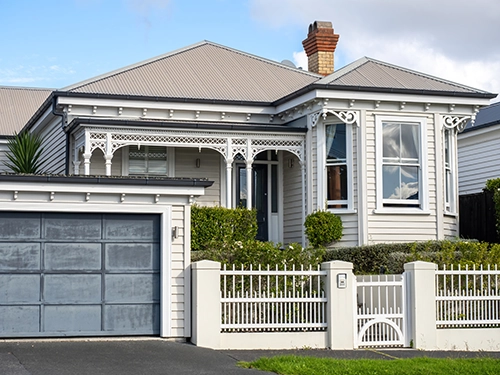
Utilities
Utilities also work differently. If you rely on space heaters, your power bills can run high. Rural homes may use water tanks.
Another thing Heather learned is that Kiwis do frequent rental inspections. Insurance companies often require this rental inspection process, and anyone entering the property must provide at least 48 hours’ notice. “Either the real estate agent leasing the property or the landlord will stop by the house once a month. They’ll come into the house, look around, and take pictures. It’s very invasive, and we weren’t prepared for that,” she says.
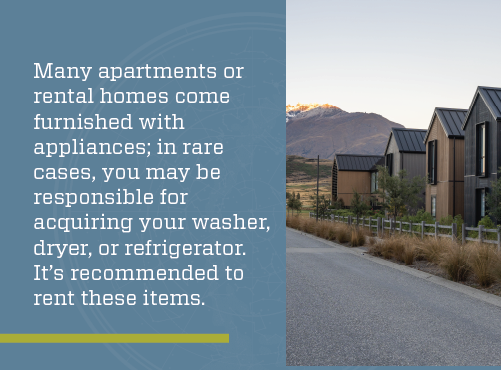
While many apartments or rental homes come furnished with appliances, in rare cases, you may be responsible for acquiring your washer, dryer, or refrigerator. Heather also recommends renting these items because they can be expensive to buy. “There are appliance rental places that are really cheap, and they will deliver them to you,” she says. “For three appliances, you pay $20 a week, and if anything breaks, they’ll come and fix it.”
For home rentals, garbage and recycling services will need to be arranged. “There’s usually one company that does the area,” says Heather. “They’ll ask you what size bin you want in liters. Depending on the company, garbage is usually picked up every fortnight, and recycling is every week.”
Services like phone, internet, and TV typically don’t require you to lock into a yearlong contract, says Heather, but she says it’s worth checking that you can get out of it without a penalty if they do.
How to find a rental in New Zealand
There are two main ways locum physicians obtain housing—either through the employer or on their own. In the former case, some employers provide a furnished house or apartment as part of the compensation package. These lodgings are typically located near the worksite and, while simple, are clean and comfortable. More often, the employer will provide a stipend for accommodation, and you’ll be responsible for finding your own place to live.

If you are tasked with finding your own lodging, Heather recommends these websites to start your housing search: realestate.co.nz, Trade Me, and propertybrokers.co.nz. These sites offer rentals through real estate agencies and private parties wanting to rent their properties. You can search by how many bedrooms you need or if they allow pets.
Look at lifestyle properties if you want more space or something out in the country. Because they traveled to New Zealand with their pets, Heather’s family decided to pursue this option. “We ended up a little outside of town on a property that had about an acre, and it was beautiful. It was next to some farms, and we met some great people.”
Ensure a smooth locums assignment: How to prepare for an assignment in New Zealand
Practicing medicine in New Zealand
Clinically, locum tenens physicians in New Zealand encounter new challenges and opportunities.

Resource-conscious care. In New Zealand’s socialized healthcare system, physicians rely on strict criteria for tests and imaging.
Unique conditions. New Zealand’s unique conditions also shaped Dr. Heine’s experience. With some of the world’s highest skin cancer rates, he developed new medical skills to better evaluate patients. “I learned dermoscopy, which helps me better assess lesions. There’s a hole in the ozone layer there, and that’s maybe why people are so sun-exposed and why the rates of skin cancer—melanoma, basal cell, and squamous cell—are so high." It’s a skill set he now carries into his U.S. practice. Family medicine physician Dr. Myra Dimitrov, who worked in rural Northland, saw a similar pattern: “We do at least two or three biopsies a week, and I feel like I’ve diagnosed at least 10 skin cancers in six months.” Beyond skin cancer, Dimitrov also noted that respiratory disease and asthma affect one in five New Zealanders, and she frequently treated children with ear and respiratory infections, as well as patients with gout.
Malpractice environment: New Zealand has a very doctor-friendly system for medical malpractice, so it's not a common occurrence. "I appreciate not having the cloud hanging over my shoulder," Dr. Kapala says. "I like that safety net."
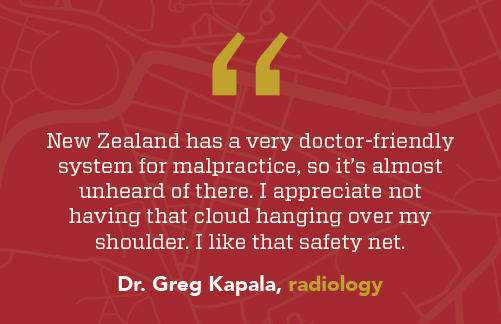
Patient populations and cultural differences
Working in New Zealand also means connecting with culturally diverse patients.
In Northland, Dr. Dimitrov cared for a predominantly Māori population. “Most people here work in agriculture, like cattle farming or orchards, since it’s so rural,” she says.
“We do a lot of urgent care,” Dr. Dimitrov says, “so it’s really interesting. I see fractures; I’ve done suturing in the clinic. Because there’s sometimes a long wait for a specialist, you can do many higher-level management things that you normally wouldn't be able to do in a city, where you conveniently refer to other people. We’re also on call a lot.”
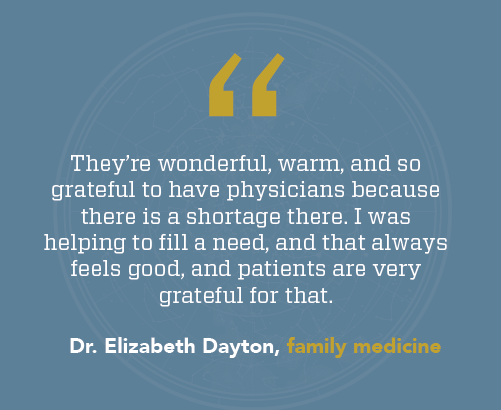
Dr. Heine also reflected on the cultural respect embedded in daily life: “They’re working towards becoming a bicultural country, and I just love the respect and acknowledgement of the Indigenous people. Even government officials greet the country first in Te Reo Māori, the native language, and children learn the language in school.”
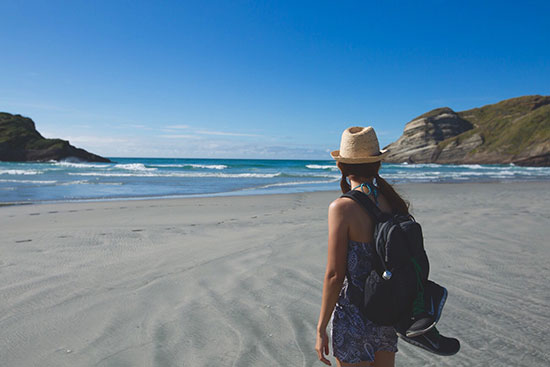
Day-to-day Life in New Zealand
Outside of work, New Zealand’s natural beauty and rich cultural heritage are significant perks.
Dr. Dimitrov lives right on the beach in Ahipara: “After work, I go swimming, which is pretty awesome. We saw dolphins right outside our window.” Her family spends weekends hiking and exploring.
The Heines loved living within walking distance of the ocean, hiking trails, and their daughter’s preschool. Dr. Heine often biked into the countryside before or after work, and he also signed up his oldest daughter for horse riding lessons.
Dr. Kapala treasures the flexibility locums gave him to hike, explore, and even build friendships with colleagues he now visits abroad. “The scenery is spectacular. It’s got really good food. It’s just very comfortable for me. It’s like going home every time I go back there,” he says.
“Working in a smaller community on the North Island allowed us to live on the beach, swim, and walk every day. I just enjoyed the beauty of New Zealand, which is hard to even convey in words,” says Dr. Dayton.
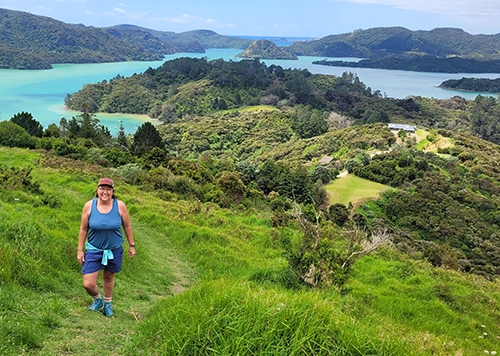
Dr. Dayton's wife, Rachel, hiking in New Zealand
Support from Global Medical Staffing
Nearly every physician and family emphasized how critical Global Medical Staffing’s support was to making their move to New Zealand successful. From the earliest conversations about assignments to the day they stepped off the plane, recruiters and coordinators were there to smooth the process.
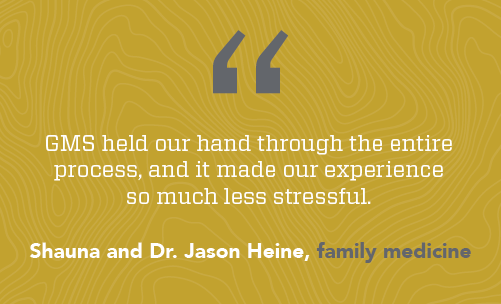
The Heine family recalls how seamless their transition was. “From visas to housing to vehicles, the transition ran smoothly,” the Heines share.
Dr. Dayton agrees: “They arranged housing and visas for my spouse and daughter when I went to New Zealand. My recruiter and team have been such an advocate for me, and I’ve really, really appreciated how they’ve supported me and my family.”
A big advantage, according to Dr. Dayton, is continuity. Having one consistent agency also minimizes paperwork fatigue, she notes: “Since they already have all of my information, that takes much of that off my plate.”
Across all the stories, the common thread is reassurance: physicians didn’t feel like they were navigating international relocation alone. GMS’s recruiters not only knew the steps but anticipated the bumps, ensuring that once doctors arrived in New Zealand, they could settle into their work and their new life with confidence.
Advice for future locum tenens physicians in New Zealand
Plan early. Start banking, visas, and pet arrangements months ahead.
Be flexible. Expect differences in housing, healthcare delivery, and daily routines.
Immerse yourself. Learn about Māori culture, try local foods, and connect with colleagues.
Take advantage of time off. Long weekends are perfect for exploring beaches, mountains, and cities.
Rely on your recruiter. Global Medical Staffing’s support reduces stress and helps you focus on the experience.
As Dr. Dayton reflects: “I feel like I’m enjoying my life more. I have a lot more balance in my life, a lot more time for family, and I’ve been able to travel and see the world. It’s been really lovely. I thought that locums might be a good temporary thing for me, but now that I’ve done it, I think I’m going to continue with locums until I retire.”
Debunking international locums myths: 7 misconceptions about taking international assignments
New Zealand locums is a rewarding adventure
Working locum tenens in New Zealand is not without its challenges, from paperwork to pets to heating a drafty house. However, our physicians agreed that the rewards far outweigh the hassles. They gained professional skills, experienced a new culture, and shared unforgettable adventures with their families.
While there’s a lot to think about when it comes to locum tenens in New Zealand, Heather says the nuances of living in a different country were part of its appeal. “There’s a lot less worry there. It’s relaxing because you can do your work, enjoy your friends, have really good food, and get outside. I felt very safe and comfortable there.”
Are you ready to start your New Zealand adventure? Give us a call at 1.800.760.3174 or view today’s job opportunities.

